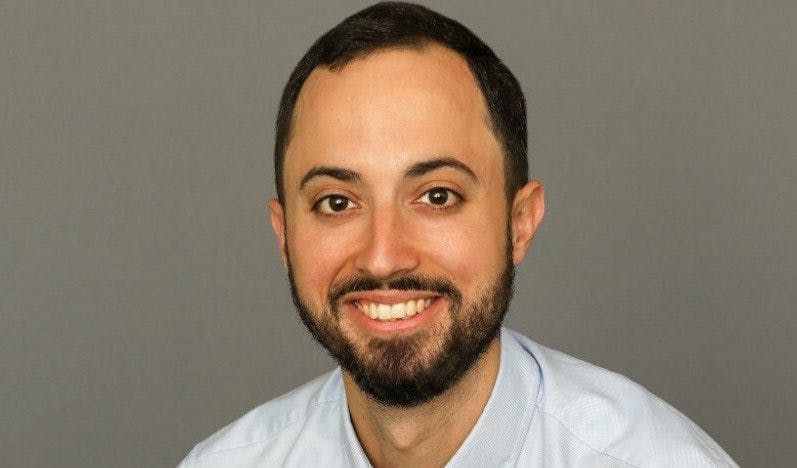Gone Crypto: From Goldman Sachs to Digital Asset Risk-Monitoring Start-Up Solidus
Solidus Labs CEO Asaf Meir told Blockworks that the digital asset industry’s ‘blank canvas’ appealed to him because he was able to create something out of nothing.

Solidus Labs CEO Asaf Meir
- Originally from Tel Aviv, Israel, Meir completed his mandatory military service before heading to the US to study economics and computer science
- His first job at Goldman Sachs was similar to the army, said Meir. “You go in with a uniform, which is the suit, and there’s protocols and agendas for everything.”
Solidus Labs CEO Asaf Meir may come ‘late’ to the crypto space, relatively speaking, but he has certainly made his mark.
“I’m not one of those people that traded bitcoin for pizza in 2010, definitely not,” Meir said. “I learned about it on the trading floor.”
Meir came to the United States to study economics and computer science after serving in the Israeli Defense Force. He interned with Microsoft and worked with a variety of startups in the tech space before eventually moving to Goldman Sachs.
“I’m from Tel Aviv, Israel, and I completed the mandatory army service there,” said Meir. “I ended up at Goldman Sachs, years later, and Goldman, in many ways, was similar to the army, you go in with a uniform, which is the suit, and there’s protocols and agendas for everything.”
A major gap in the industry
Meir started on the electronic trading desk at Goldman. There his role combined his two areas of study and was the perfect place to learn capital markets and trading from some of the greatest minds in the industry, he said. And, it was at Goldman that he first came across digital assets.
“It was around 2017 when I stumbled across a blockchain edition of the Goldman Research Division on the trading floor, and that’s really when I opened my eyes into this whole different realm of things,” he said.
Meir’s computer science brain started to kick in as he delved deeper into crypto, and that’s when he saw a major gap in the market for security.
“One of the things that became clear, in our view, was the need for tailored risk mitigation tools,” said Meir. “In order to usher in mainstream adoption and institutional adoption in two to three years time, tailored risk mitigation tools were going to be essential.”
Meir saw that the traditional financial world had doubts about digital assets because cryptocurrencies presented a host of concerns around volatility, security and pricing. Many in the traditional finance space didn’t know how to approach these problems.
“One of the signals we’ve seen time and time again is the SEC’s rejection of a bitcoin ETF due to the lack of sufficient trade surveillance,” said Meir. “There is a notion that bad actors are manipulating price and volumes on different executing platforms, whether it be exchanges, broker dealers, OTC desks, liquidity providers and the like. We saw this happening, and we started creating a thesis around the need for tailored surveillance solutions.”
Focusing on market manipulation
At the time, Meir said, there was a major focus on anti-money laundering (AML), and he noticed that no one seemed to be looking at other risk areas, like market manipulation.
“A lot of people were discussing AML, which is extremely important,” he said. “But a lot of people were not yet considering the blatant manipulation that was taking place on different execution venues. In fact, we think that bad actors can gain much more from manipulating volume and prices, then possibly money laundering.”
Cryptocurrencies are an entirely new asset class, Meir said, and the way bad actors go about manipulating this new market is something the financial world has never encountered before.
“Quite literally, the way bad actors are manipulating this market is different,” he said. “Coupled with the evolving regulatory landscape, it really rendered the incumbents’ ability to point out manipulation obsolete.”
This realization prompted Meir and his co-founders to leave Goldman to launch Solidus Labs, a market surveillance and risk monitoring hub tailored for digital assets.
“The decision to leave was triggered by a combination of what I call the ‘Israeli entrepreneurial bug,’ and characteristics of the industry that really appealed to me, which is the inclusion and accessibility that the crypto ecosystem fosters,” Meir said.
That entrepreneurial bug has proved its worth so far. In May, Solidus closed its Series A funding round, led by Evolution Equity Partners. The company also experienced a 400% increase in inbound demand, which Meir attributes to increased institutional interest and the growing understanding that market participants need to take regulatory restraints seriously.
“Colleagues and mentors that know me well, I don’t think were too surprised,” Meir said. “I always like to challenge the norms, it’s almost in my DNA. I told everyone what appealed to me so much about this industry, and that is that this is a blank canvas, we can create something out of nothing.”
Have your own Gone Crypto story to tell? Email us at [email protected].






